Depression can be so dark and suffocating that it feels like you’re being pressed into a corner and can’t get away. It can be too heavy to lift off your shoulders or easy to tuck away in front of others, but no matter how it manifests itself, it is ever present in the back of your mind. It can be totally different from one day to another. Some days you feel utterly defeated, others feel like you hardly know what depression ever felt like and you bask in the first sunny day you’ve had for weeks.
How do we extend those sunny days little by little with gentle natural healing?
Healing Depression Naturally – The Herbalist’s Way
Herbs have always been the first thing I reach for for every problem I’ve ever faced, including depression. I’m sure everyone has experienced feeling blue from time to time, that’s normal life for ya! But when you start to feel that creeping and unrelenting helplessness, herbs can really help with even the darkest of days. However, if your depression won’t let up, it can be very serious. If that is what you’re experiencing, then I strongly suggest seeing your physician.
That said, there are a number of amazing plant allies that help with mild depression, so if you’re one of those people who want to explore healthier alternatives, this post is for you!
The Causes of Depression
Depression is such a complex beast to deal with but recognizing what’s causing it may help you on your healing journey. Pinpointing the root cause will not only help you find helpful nourishing herbs that ease symptoms, it will also give you insight on what you may need to change in your life in order to heal depression naturally.
Some of the most common root causes of depression include:
• Body image- aka body dismorphia
• Career/ dead end job
• Desperation and hopelessness
• Emotional or spiritual issues
• Family and other close relationships
• Financial stress
• Isolation
• Lifestyle
• Personal health
• Unrealistic expectation towards yourself or others
• Your depression is a learned behavior
Once you understand what your triggers are, you can begin to point those situations in the right direction by making changes whether that be cutting ties with toxic people, opening a savings account with an automatic monthly deposit, or by changing your eating habits for better health. The key is to move FORWARD and an important factor in doing that is to know what type of depression you have.
The Many Types of Depression
So this may come as a surprise, but did you know that there are actually many different forms of depression? This is why certain herbal remedies work for some and not for others. That's why it’s important to understand the different types of depression and which ones relate to you so that you can implement the correct herbal remedies for your unique situation.
It may sound complicated, but if once you look through my list below, you will begin to recognize symptoms that relate to you. Keep in mind too that it is normal for different types of depression to overlap one another. I personally have about 3-4 given types of depression and have found herbs that treat more than one type for my unique depression complex and so can you!
If things are confusing, don’t hesitate to ask for guidance in the comments. Just remember, I am NOT a doctor and it is highly recommended to go over these remedies with your physician first.
Gastrointestinal Inflammation Based Depression
Did you know that inflammation in the gut directly affects the brain, our mood, and our emotions? When our gut is sick and inflamed those same symptoms can manifest themselves into depression.
GI Based Depression Symptoms Include:
• Celiac disease
• Chronic constipation
• Chronic diarrhea
• Crohn’s disease
• IBD
• IBS
• Leaky gut
• Loud intestinal gurgling
Herbs for Healing GI Based Depression Naturally Include:
• St. John’s Wort - aides the solar plexus, the portion of the brain responsible for regulating digestion.
Hepatic (Melancholic) Depression
Hepatic Depression is often associated with intense dark, dreary, gloomy feelings accompanied by chronic anxiety. This type of depression often negatively affects normal everyday life activities like sleeping and eating making those who suffer from it chronically tired and malnourished.
Hepatic Depression Symptoms Include:
• Anxiety
• Despondency
• insomnia
• Loss of appetite
• Moodiness
Herbs for Healing Hepatic Depression Naturally Include:
• Plain Coffee
• Rosemary - a very uplifting herb that lowers cortisol substantially with just a few deep breaths.
• St John’s Wort - known to ease nerves and anxiety.
Hormonal Depression
This type of depression often occurs during periods of hormonal transitioning and fluctuation i.e. during puberty, pregnancy, menses, or menopause.
Hormonal Depression Symptoms Include:
• Andropausal depression
• Hormone therapy
• Menopausal depression
• OMS-based depression
• Pregnancy (unfortunately the herbs for hormonal depression cannot be taken during pregnancy)
• Puberty associated with depression
Herbs for Healing Hormonal Depression include:
• Black cohosh - a nourishing herb for women that restores hormonal balance.
• L-carnitine (for men)
• Milky oats - a deeply nourishing relaxing nervine for stress, anxiety, and depression.
• Muira pauma - relieves depression associated with sexual dysfunction.
HPA Axis Dysfunction Induced Depression
This type of depression is one that I know all too well as it has to do with very strong over-reactive emotions in response to stress and chronic pain. It’s very easy to go from zero to sixty emotionally in just a matter of seconds, fly off the handle, and make hasty uncalculated decisions. People with this type of depression also develop nervous ticks due to chronic stressful situations at work or home. It is often caused by blood sugar fluctuations (aka getting HANGRY), endocrine dysfunction, and overall chronic stress and fatigue.
HPA Axis Dysfunction Induced Depression Symptoms Include:
• Fatigue
• Insomnia
• Mood swings
• Nervous ticks and fidgeting
• Over-reactive emotions
• Sudden rage
Herbs for Healing HPA AXIS Induced Depression Include:
• Ashwagandha - has the ability to stabilize the mood and anxiety associated with isolation in particular.
• Cordyceps (I also like this one) - helps increase energy stores, relieves stress, and contains MOA inhibitors (anti-depressant constituents)
• Gynostemma - strengthens a person's adaptive capasity allowing them to process stress, anxiety, and depression in the best way possible.
• Magnesium – not an herb but VERY helpful for poor sleep, stress, and anxiety.
• Milky oats
• Schisandra berry - a wondeeful herb for women that balances hormones, increases energy, and reduces stress/anxiety.
• Skullcap - soothes high heart palpitations and instills a sense of calm.
Postpartum Depression
An all too familiar companion for many women, this type of depression occurs after the birth of a child that brings with it some very powerful and contradicting emotions. Postpartum depression is closely related to hormonal depression in that it involves a rapid readjustment of hormones.
Postpartum Depression Symptoms Include:
• Exhaustion both mentally and physically
• Frequent crying
• Insomnia
• Lack of appetite
• Powerful mood swings
• Very strong emotions of joy, fear, and anxiety
Herbs for Healing Postpartum Depression Naturally Include:
• Alfalfa - nourishes the nervouse system.
• Ginger - enhances blood flow, warming.
• Lemon balm - calms freyed nerves, eases stress, and improves sleep.
• Nettles - deeply nourishes the body after child birth with vitamins and minerals.
All of the above herbs are safe for consumption during breastfeeding and can also be found in this convenient tea blend.
Stagnant Depression
Coined by David Winston, stagnant depression manifest itself from specific situations that have caused a person to spiral into a deep and chronic state of depression. This could stem from an unhealthy relationship, the death of a loved one, or when something terrible has happened. Often these people will feel stuck in time in the moment of the tragedy for many years after it has happened and will often experience flashbacks.
Stagnant Depression Symptoms Include:
• A broken heart that lasts for long periods of times, even years
• Chronic and unrelenting grief
• Chronic situational depression
• Isolation
• Obsession about what happened
• Post-traumatic stress disorder
Herbs for Healing Stagnant Depression Naturally Include:
• Damiana
• Holy basil - an amazing adaptogen that helps you react to stress in the best way possible.
• Lavender - relaxing, calming, and improves sleep.
• Rose petal (also contains holy basil)
• Rosemary - lowers stress and improves the mood. Gives you clarity.
Old Age Depression
Old age depression manifests itself as an obsession to stay young or live as long as possible. It can also stem from life’s ups and downs and is a bit different than other types of depression in the sense that its cause is essentially due to aging and what that entails such as:
• Fear of aging and death
• Illness
• Lack of exercise
• Losing friends and family
• Malnutrition
• Medciation-induced
Herbs for Supporting Old Age Depression Include:
• Damiana - uplifts emotions for up to 1 ½ hours after taking it. A great herb to help you relax before bedtime or during times of intense stress.
• Ginkgo biloba - increases blood flow to the brain and improves cognitive function.
Thyroid Induced Depression
This type of depression is common in those with thyroid illnesses like Hashimoto’s or who have general iodine deficiency.
Thyroid Induced Depression Symptoms Include:
• Constipation
• Dry hair and skin
• Fatigue
• Feeling cold within and without
• Low libido
• Mood swings
• Muscles cramps
• Poor memory
• Thinning or loss of hair
• Weight gain
Herbs for Healing Thyroid Induced Depression Include:
• Ashwagandha
• Asian ginseng - rebuilds the body's chi, nourishes the adrenals, and helps you adapt to depressive emotions.
• Bacopa - gives you mental clarity.
• L-tyrosine
• Selenium
The last two are not herbs but are very supportive supplements for this type of depression!
Rosemary Gladstar speaks about the best herbs for stress, anxiety, and depression below:
Favorite Herbs for Healing Depression Naturally
There are so many herbs to choose from that can improve your recovery from depression. Below I have listed a few that are relatively easy to find, easy to use, and are effective!
Black Cohosh
This is an herb often used for menopausal symptoms but it’s actually pretty ineffective for that. It IS however very effective to use for hormonal type depressions.
You can take black cohosh as a tea, tincture, or capsule.
Holy Basil
Holy basil is one of my absolute favorite herbs because of its ability to curb stress and help the mind let go of stagnant depression. It’s highly nourishing and is very easy for most people to take as a stress relieving tea.
If you don’t care for holy basil’s flavor, try the capsule instead.
Licorice Root
Not an herb often thought of first when thinking of healing depression naturally BUT it really should be! Licorice root has a whopping 8 different anti-depressant compounds known as MOA inhibitors that help significantly improve all types of depression, burned out adrenals, chronic fatigue, and tiredness.
To use, simply drink 2 cups of licorice tea a day for 1 week and then take a break for 1 week. Though not recommended for long term use, it is okay to use licorice root off and on.
Passion Flower
Passion flower is an amazing herb to use for those of us whose minds won’t turn off. It helps stop the incessant, circulating, unhealthy thoughts in our minds allowing us to regroup without dwelling. Passion flower itself does not treat depression, but it does help many on their path to healing depression naturally by allowing them to focus on the positive.
Passionflower it very effective as a liquid-gel capsule.
Rosemary
Rosemary is an uplifting herb that’s great for those with nervous exhaustion, depression, moodiness, restlessness, and lack of appetite. If you feel disgusted by food during depression, try smelling some rosemary essential oil before meals!
I also like to use rosemary as a tea twice a day or as a capsule. I find that this herb best for Hepatic (melancholic) Depression.
St. John’s Wort
Often referred to as the “Sunshine Herb”, St. john’s Wort is the most extensively researched herb for depression in the world. It has been shown to improve destructive though patterns, anxiety, feelings of worthlessness, and insomnia.
St. John’s Wort has an affinity for those who suffer from GI Based Depression and Hepatic Depression. I really like the liquid-gel capsule.
Pick up these herbs organically at my favorite place:
Also be sure to try my Blues Be Gone! Tea Recipe below:
[yumprint-recipe id='93']
What have been your favorite herbs for healing depression naturally?
Don't miss these other great posts on depression and mood:
13 Natural Remedies for Depression
Treating Depression Naturally: Supplements, Herbs and Foods for Feeling Better
How to Fight Depression and Anxiety Naturally: 20 Helpful Tips for Anxiety, Depression, and Fatigue
Calming Room and Body Spray
This post contains affiliate links. We are a participant in the Amazon Services LLC Associates Program, an affiliate advertising program designed to provide a means for us to earn fees by linking to Amazon.com and affiliated sites. Read my full disclosure and disclaimer.
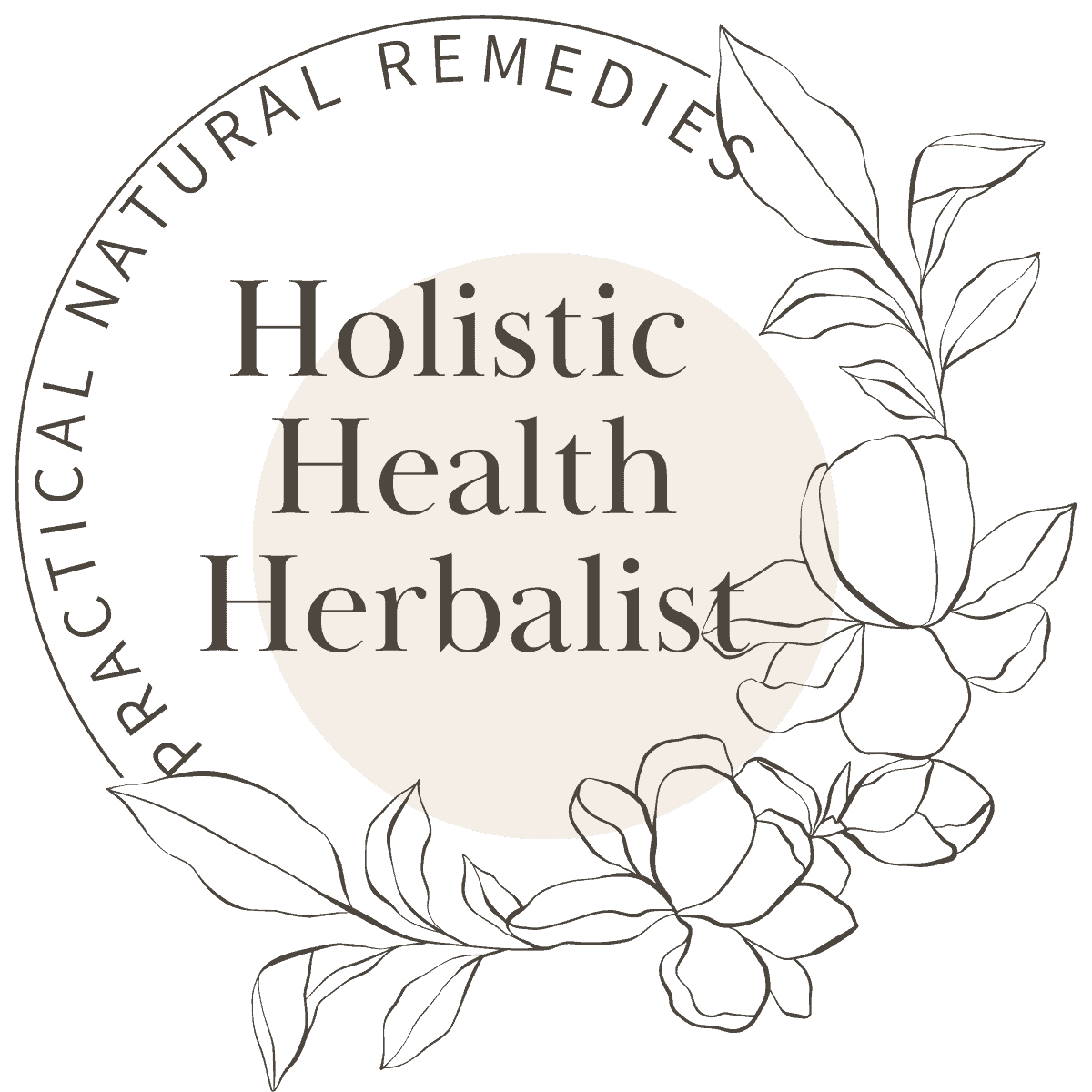

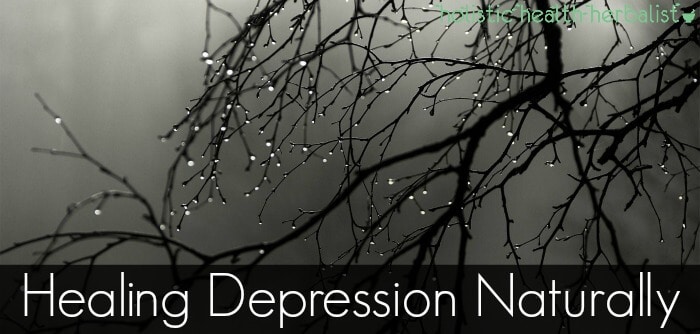

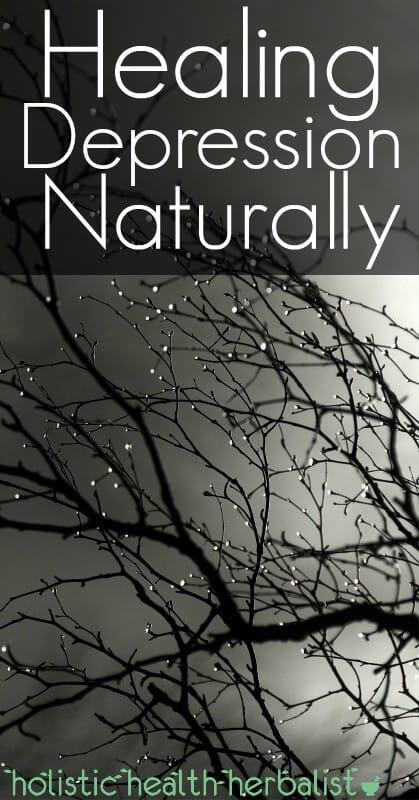
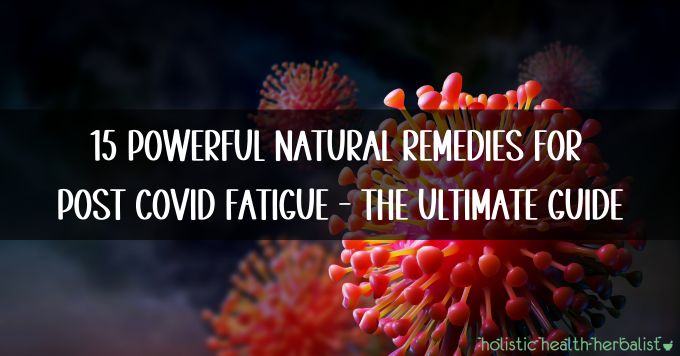
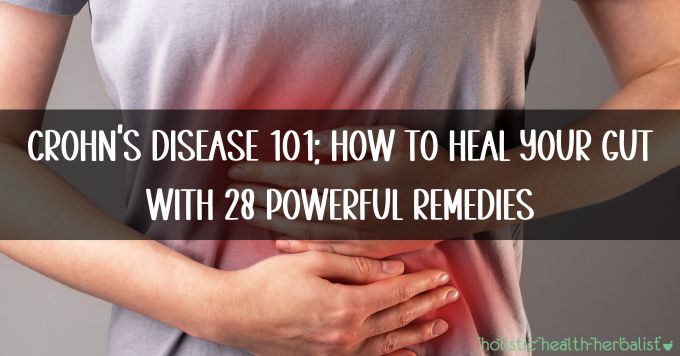
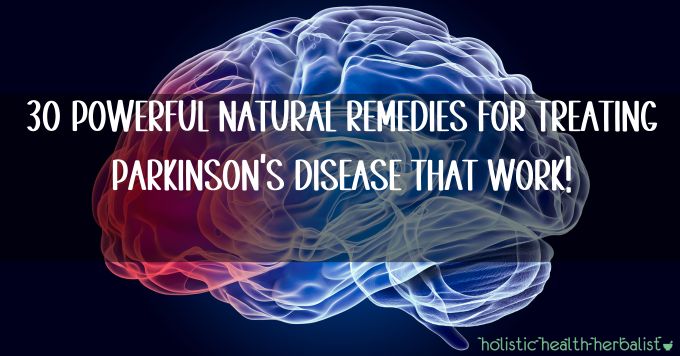
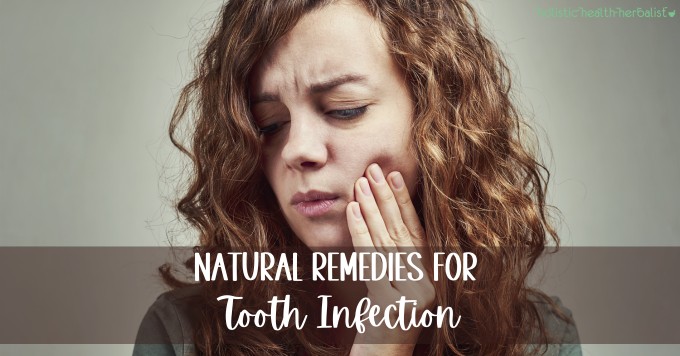
harpal says
Thanks for the nice article, one of the best article on depression in my experience, very systemic way mentioned in differentiating different types and their remedies. I wish you keep this updating for benefiting all the concerned persons.
regards
Sharon says
question came up in conversation and we can not find an answer, what do you mean by OMS-based depression?
Tash says
It means Organic Mood Syndrome or Organic Mood Disorder which is characterized by those that involve the moods or emotions of a person that are changed due to a physiological problem with the brain or nervous system. The two major types of mood disorders are depression and bipolar disorder.
Frank says
I am using Rosemary for anxiety most likely due to VDR-Tag gene. However, I'm becoming clearly agitate when taking the Pharm Herb drops. ANy questions.
Tash says
Hi Frank!
It sounds like the rosemary is overstimulating your nervous system. Perhaps try lavender instead?
megane says
wow this post is the most complet i could read , thank you so much !
Your site is so amazing , full of interresting stuff , i love it 🙂
Tash says
So glad you liked it Megane! <3
Cassie says
This is SO useful! My nephew has depression so I'll be sure to pass this article along. I'm guessing he has stagnant depression due to a bad past relationship.
Tash says
Hi Cassie!
I really hope he finds comfort. Best wishes!
Kelsey says
This post is packed with information- I love it! I will have to try that recipe!
Tash says
Thank you Kelsey! I'm happy that you find it helpful 🙂